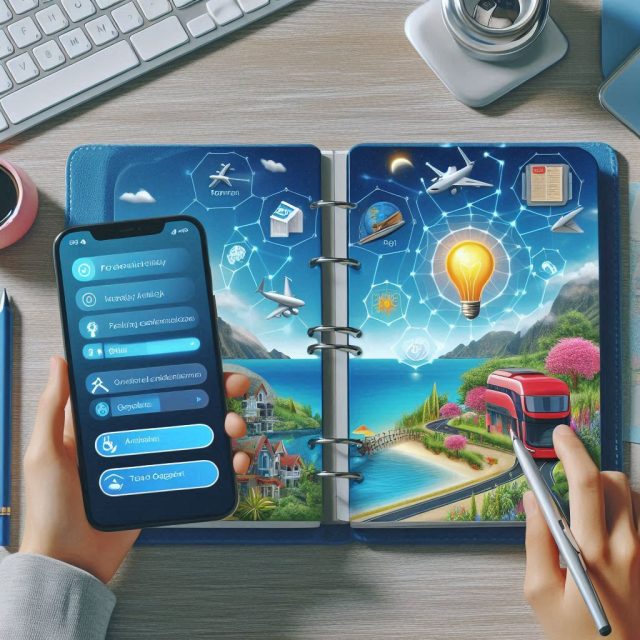The landscape of travel has transformed significantly over the past decade, driven by advances in technology and changing consumer expectations. Among the most impactful innovations in this sphere are AI travel assistants, which are revolutionizing how we plan, experience, and enjoy our trips. These intelligent systems use sophisticated algorithms and vast data repositories to offer highly personalized recommendations and streamline itinerary planning. This article delves into the workings, benefits, and future prospects of AI travel assistants.
The Evolution of Travel Planning
Traditional travel planning often involved hours of research, consultations with travel agents, and sifting through countless reviews and guides. The rise of the internet and mobile technology introduced new tools, such as booking engines and review platforms, which made travel planning more accessible but still relatively fragmented. Travelers had to piece together information from various sources, and while tools like Google Maps and TripAdvisor offered some level of convenience, they often lacked the integration and personalization needed for a seamless experience.
AI travel assistants emerged as a game-changer by leveraging machine learning, natural language processing, and data analytics to enhance the travel planning process. These systems are designed to understand user preferences, provide tailored recommendations, and automate various aspects of itinerary management. As AI technology continues to evolve, the capabilities of these assistants are expanding, offering even greater benefits to travelers.
Discover Your Journey: AI-Powered Travel, Tailored Just for You!
How AI Travel Assistants Work
AI travel assistants are built on a foundation of machine learning algorithms and data analysis. Here’s a closer look at how these systems operate:
- Data Aggregation and Integration: AI travel assistants aggregate data from multiple sources, including flight schedules, hotel availability, local attractions, weather forecasts, and user reviews. This data is then integrated into a unified platform, allowing the assistant to provide comprehensive recommendations.
- Personalization Algorithms: Personalization is a key feature of AI travel assistants. By analyzing a user’s past travel behavior, preferences, and interests, the AI can offer customized suggestions. For instance, if a user frequently books eco-friendly accommodations or enjoys historical tours, the assistant can prioritize similar options in future recommendations.
- Natural Language Processing (NLP): NLP allows AI travel assistants to understand and respond to user queries in natural language. Travelers can interact with the assistant using conversational language, asking questions like “What are the best restaurants in Paris for vegan cuisine?” The AI interprets the query, processes relevant data, and delivers a tailored response.
- Predictive Analytics: Predictive analytics help AI travel assistants anticipate user needs and preferences. For example, if the system detects that a user is planning a trip during a major local event or festival, it can alert them to book accommodations early or suggest alternative dates to avoid overcrowding.
- Real-Time Updates: AI travel assistants provide real-time information, such as flight status, weather conditions, and local event schedules. This feature is particularly useful for managing travel disruptions or making last-minute adjustments to plans.
Benefits of AI Travel Assistants
The integration of AI into travel planning offers numerous advantages, making the process more efficient, personalized, and enjoyable. Here are some key benefits:
- Enhanced Personalization: AI travel assistants excel at tailoring recommendations to individual preferences. By analyzing past behavior and preferences, these systems can suggest destinations, accommodations, and activities that align with a traveler’s unique interests.
- Time Efficiency: Planning a trip can be time-consuming, but AI travel assistants streamline the process by consolidating information and automating tasks. Travelers can quickly find relevant options without having to scour multiple websites or consult various sources.
- Improved Decision-Making: With access to a wealth of data and real-time updates, AI travel assistants provide informed recommendations. Travelers can make better decisions regarding their itineraries, accommodations, and activities, reducing the likelihood of unpleasant surprises.
- 24/7 Availability: AI travel assistants are available around the clock, providing support and information whenever needed. This continuous availability is particularly beneficial for travelers in different time zones or those with last-minute queries.
- Cost Savings: By analyzing pricing trends and offering personalized deals, AI travel assistants can help travelers find cost-effective options. For example, the system might suggest cheaper travel dates or alert users to special promotions and discounts.
- Seamless Integration: Many AI travel assistants integrate with other tools and platforms, such as calendar apps and social media. This integration allows for a more cohesive travel experience, as users can sync their travel plans with their schedules and share their experiences with friends and family.
Your Custom Travel Companion: AI Curated, Just for You
Use Cases of AI Travel Assistants
AI travel assistants are being employed in various ways to enhance the travel experience. Here are some notable use cases:
- Trip Planning and Itinerary Management: AI travel assistants can create detailed itineraries based on user preferences and requirements. For instance, a user interested in a cultural tour of Japan might receive a customized itinerary that includes visits to historical sites, traditional festivals, and local culinary experiences.
- Booking and Reservations: AI systems can facilitate bookings for flights, hotels, and activities. By comparing options across different platforms, these assistants help travelers secure the best deals and ensure availability.
- Local Recommendations: Once travelers arrive at their destination, AI assistants can provide real-time recommendations for local attractions, dining options, and entertainment. This feature is particularly useful for exploring new cities and discovering hidden gems.
- Travel Assistance and Support: In case of disruptions, such as flight delays or cancellations, AI travel assistants can offer alternative solutions and rebook services. They can also provide information about local emergency contacts and support services.
- Personalized Travel Experiences: Some AI travel assistants use advanced algorithms to curate unique experiences based on user preferences. For example, a traveler interested in adventure sports might receive recommendations for activities like zip-lining, hiking, or scuba diving.
Challenges and Limitations
Despite their many advantages, AI travel assistants are not without challenges and limitations. Some of the key issues include:
- Data Privacy and Security: AI travel assistants handle vast amounts of personal data, raising concerns about privacy and security. Ensuring that user data is protected and used responsibly is a critical consideration for developers and service providers.
- Algorithmic Bias: AI systems can inadvertently reinforce biases present in their training data. This can lead to skewed recommendations or exclude certain preferences and needs. Developers must work to minimize bias and ensure inclusivity in AI travel tools.
- Dependence on Data Quality: The effectiveness of AI travel assistants relies on the quality and accuracy of the data they use. Inaccurate or outdated information can lead to suboptimal recommendations and user dissatisfaction.
- User Trust and Adoption: While AI technology is advancing rapidly, some travelers may still be hesitant to fully rely on AI for their travel planning. Building user trust and demonstrating the reliability of these systems is essential for widespread adoption.
- Integration with Existing Systems: AI travel assistants need to integrate seamlessly with other travel services and platforms. Ensuring compatibility and smooth interaction between different systems can be a complex and ongoing challenge.
The Future of AI Travel Assistants
The future of AI travel assistants is poised to bring even more innovations and improvements. Here are some potential developments on the horizon:
- Enhanced Personalization: As AI technology continues to evolve, travel assistants will offer even more personalized and nuanced recommendations. Future systems may incorporate advanced contextual understanding and emotional intelligence to better cater to individual preferences.
- Improved Natural Language Processing: Advances in NLP will enable more sophisticated and natural interactions between travelers and AI assistants. Users will be able to communicate with these systems in a more conversational and intuitive manner.
- Integration with Emerging Technologies: AI travel assistants will increasingly integrate with emerging technologies, such as virtual reality (VR) and augmented reality (AR). These integrations could provide immersive previews of destinations and enhance the planning experience.
- Greater Focus on Sustainability: With growing awareness of environmental issues, AI travel assistants will likely emphasize sustainable travel practices. They may prioritize eco-friendly accommodations, transportation options, and activities that support conservation efforts.
- Proactive Assistance: Future AI travel assistants may become more proactive in anticipating user needs and providing timely suggestions. For example, they might offer recommendations based on upcoming local events, seasonal trends, or recent changes in travel regulations.
Conclusion
AI travel assistants represent a significant advancement in the realm of travel planning, offering personalized recommendations and streamlined itinerary management. By harnessing the power of machine learning, natural language processing, and data analytics, these systems provide travelers with tailored experiences, improved decision-making, and enhanced convenience. While challenges such as data privacy and algorithmic bias remain, ongoing advancements in AI technology promise to address these issues and further enrich the travel experience. As AI travel assistants continue to evolve, they will play an increasingly central role in shaping the future of travel, making it more personalized, efficient, and enjoyable.






